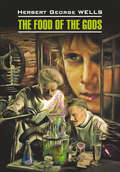
Герберт Джордж Уэллс
The History of Mr. Polly
III
“You ain’t talkin’ of goin’!” cried Mrs. Larkins.
“Supper at eight.”
“Stay to supper with us, now you ’ave come over,” said Mrs. Larkins, with corroborating cries from Minnie. “’Ave a bit of a walk with the gals, and then come back to supper. You might all go and meet Annie while I straighten up, and lay things out.”
“You’re not to go touching the front room mind,” said Miriam.
“Who’s going to touch yer front room?” said Mrs. Larkins, apparently forgetful for a moment of Mr. Polly.
Both girls dressed with some care while Mrs. Larkins sketched the better side of their characters, and then the three young people went out to see something of Stamton. In the streets their risible mood gave way to a self-conscious propriety that was particularly evident in Miriam’s bearing. They took Mr. Polly to the Stamton Wreckeryation ground – that at least was what they called it – with its handsome custodian’s cottage, its asphalt paths, its Jubilee drinking fountain, its clumps of wallflower and daffodils, and so to the new cemetery and a distant view of the Surrey hills, and round by the gasworks to the canal to the factory, that presently disgorged a surprised and radiant Annie.
“El-lo” said Annie.
It is very pleasant to every properly constituted mind to be a centre of amiable interest for one’s fellow creatures, and when one is a young man conscious of becoming mourning and a certain wit, and the fellow creatures are three young and ardent and sufficiently expressive young women who dispute for the honour of walking by one’s side, one may be excused a secret exaltation. They did dispute.
“I’m going to ’ave ’im now,” said Annie. “You two’ve been ’aving ’im all the afternoon. Besides, I’ve got something to say to him.”
She had something to say to him. It came presently. “I say,” she said abruptly. “I did get them rings out of a prize packet.”
“What rings?” asked Mr. Polly.
“What you saw at your poor father’s funeral. You made out they meant something. They didn’t – straight.”
“Then some people have been very remiss about their chances,” said Mr. Polly, understanding.
“They haven’t had any chances,” said Annie. “I don’t believe in making oneself too free with people.”
“Nor me,” said Mr. Polly.
“I may be a bit larky and cheerful in my manner,” Annie admitted. “But it don’t mean anything. I ain’t that sort.”
“Right O,” said Mr. Polly.
IV
It was past ten when Mr. Polly found himself riding back towards Easewood in a broad moonlight with a little Japanese lantern dangling from his handle bar and making a fiery circle of pinkish light on and round about his front wheel. He was mightily pleased with himself and the day. There had been four-ale to drink at supper mixed with gingerbeer, very free and jolly in a jug. No shadow fell upon the agreeable excitement of his mind until he faced the anxious and reproachful face of Johnson, who had been sitting up for him, smoking and trying to read the odd volume of “Purchas his Pilgrimes,” – about the monk who went into Sarmatia and saw the Tartar carts.
“Not had an accident, Elfrid?” said Johnson.
The weakness of Mr. Polly’s character came out in his reply. “Not much,” he said. “Pedal got a bit loose in Stamton, O’ Man. Couldn’t ride it. So I looked up the cousins while I waited.”
“Not the Larkins lot?”
“Yes.”
Johnson yawned hugely and asked for and was given friendly particulars. “Well,” he said, “better get to bed. I have been reading that book of yours – rum stuff. Can’t make it out quite. Quite out of date I should say if you asked me.”
“That’s all right, O’ Man,” said Mr. Polly.
“Not a bit of use for anything I can see.”
“Not a bit.”
“See any shops in Stamton?”
“Nothing to speak of,” said Mr. Polly. “Goo-night, O’ Man.”
Before and after this brief conversation his mind ran on his cousins very warmly and prettily in the vein of high spring. Mr. Polly had been drinking at the poisoned fountains of English literature, fountains so unsuited to the needs of a decent clerk or shopman, fountains charged with the dangerous suggestion that it becomes a man of gaiety and spirit to make love, gallantly and rather carelessly. It seemed to him that evening to be handsome and humorous and practicable to make love to all his cousins. It wasn’t that he liked any of them particularly, but he liked something about them. He liked their youth and femininity, their resolute high spirits and their interest in him.
They laughed at nothing and knew nothing, and Minnie had lost a tooth and Annie screamed and shouted, but they were interesting, intensely interesting.
And Miriam wasn’t so bad as the others. He had kissed them all and had been kissed in addition several times by Minnie, – “oscoolatory exercise.”
He buried his nose in his pillow and went to sleep – to dream of anything rather than getting on in the world, as a sensible young man in his position ought to have done.
V
And now Mr. Polly began to lead a divided life. With the Johnsons he professed to be inclined, but not so conclusively inclined as to be inconvenient, to get a shop for himself, to be, to use the phrase he preferred, “looking for an opening.” He would ride off in the afternoon upon that research, remarking that he was going to “cast a strategetical eye” on Chertsey or Weybridge. But if not all roads, still a great majority of them, led by however devious ways to Stamton, and to laughter and increasing familiarity. Relations developed with Annie and Minnie and Miriam. Their various characters were increasingly interesting. The laughter became perceptibly less abundant, something of the fizz had gone from the first opening, still these visits remained wonderfully friendly and upholding. Then back he would come to grave but evasive discussions with Johnson.
Johnson was really anxious to get Mr. Polly “into something.” His was a reserved honest character, and he would really have preferred to see his lodger doing things for himself than receive his money for housekeeping. He hated waste, anybody’s waste, much more than he desired profit. But Mrs. Johnson was all for Mr. Polly’s loitering. She seemed much the more human and likeable of the two to Mr. Polly.
He tried at times to work up enthusiasm for the various avenues to well-being his discussion with Johnson opened. But they remained disheartening prospects. He imagined himself wonderfully smartened up, acquiring style and value in a London shop, but the picture was stiff and unconvincing. He tried to rouse himself to enthusiasm by the idea of his property increasing by leaps and bounds, by twenty pounds a year or so, let us say, each year, in a well-placed little shop, the corner shop Johnson favoured. There was a certain picturesque interest in imagining cut-throat economies, but his heart told him there would be little in practising them.
And then it happened to Mr. Polly that real Romance came out of dreamland into life, and intoxicated and gladdened him with sweetly beautiful suggestions – and left him. She came and left him as that dear lady leaves so many of us, alas! not sparing him one jot or one tittle of the hollowness of her retreating aspect.
It was all the more to Mr. Polly’s taste that the thing should happen as things happen in books.
In a resolute attempt not to get to Stamton that day, he had turned due southward from Easewood towards a country where the abundance of bracken jungles, lady’s smock, stitchwork, bluebells and grassy stretches by the wayside under shady trees does much to compensate the lighter type of mind for the absence of promising “openings.” He turned aside from the road, wheeled his machine along a faintly marked attractive trail through bracken until he came to a heap of logs against a high old stone wall with a damaged coping and wallflower plants already gone to seed. He sat down, balanced the straw hat on a convenient lump of wood, lit a cigarette, and abandoned himself to agreeable musings and the friendly observation of a cheerful little brown and grey bird his stillness presently encouraged to approach him. “This is All Right,” said Mr. Polly softly to the little brown and grey bird. “Business – later.”
He reflected that he might go on this way for four or five years, and then be scarcely worse off than he had been in his father’s lifetime.
“Vile Business,” said Mr. Polly.
Then Romance appeared. Or to be exact, Romance became audible.
Romance began as a series of small but increasingly vigorous movements on the other side of the wall, then as a voice murmuring, then as a falling of little fragments on the hither side and as ten pink finger tips, scarcely apprehended before Romance became startling and emphatically a leg, remained for a time a fine, slender, actively struggling limb, brown stockinged and wearing a brown toe-worn shoe, and then – . A handsome red-haired girl wearing a short dress of blue linen was sitting astride the wall, panting, considerably disarranged by her climbing, and as yet unaware of Mr. Polly…
His fine instincts made him turn his head away and assume an attitude of negligent contemplation, with his ears and mind alive to every sound behind him.
“Goodness!” said a voice with a sharp note of surprise.
Mr. Polly was on his feet in an instant. “Dear me! Can I be of any assistance?” he said with deferential gallantry.
“I don’t know,” said the young lady, and regarded him calmly with clear blue eyes.
“I didn’t know there was anyone here,” she added.
“Sorry,” said Mr. Polly, “if I am intrudaceous. I didn’t know you didn’t want me to be here.”
She reflected for a moment on the word. “It isn’t that,” she said, surveying him.
“I oughtn’t to get over the wall,” she explained. “It’s out of bounds. At least in term time. But this being holidays – ”
Her manner placed the matter before him.
“Holidays is different,” said Mr. Polly.
“I don’t want to actually break the rules,” she said.
“Leave them behind you,” said Mr. Polly with a catch of the breath, “where they are safe”; and marvelling at his own wit and daring, and indeed trembling within himself, he held out a hand for her.
She brought another brown leg from the unknown, and arranged her skirt with a dexterity altogether feminine. “I think I’ll stay on the wall,” she decided. “So long as some of me’s in bounds – ”
She continued to regard him with eyes that presently joined dancing in an irresistible smile of satisfaction. Mr. Polly smiled in return.
“You bicycle?” she said.
Mr. Polly admitted the fact, and she said she did too.
“All my people are in India,” she explained. “It’s beastly rot – I mean it’s frightfully dull being left here alone.”
“All my people,” said Mr. Polly, “are in Heaven!”
“I say!”
“Fact!” said Mr. Polly. “Got nobody.”
“And that’s why – ” she checked her artless comment on his mourning. “I say,” she said in a sympathetic voice, “I am sorry. I really am. Was it a fire or a ship – or something?”
Her sympathy was very delightful. He shook his head. “The ordinary table of mortality,” he said. “First one and then another.”
Behind his outward melancholy, delight was dancing wildly. “Are you lonely?” asked the girl.
Mr. Polly nodded.
“I was just sitting there in melancholy rectrospectatiousness,” he said, indicating the logs, and again a swift thoughtfulness swept across her face.
“There’s no harm in our talking,” she reflected.
“It’s a kindness. Won’t you get down?”
She reflected, and surveyed the turf below and the scene around and him.
“I’ll stay on the wall,” she said. “If only for bounds’ sake.”
She certainly looked quite adorable on the wall. She had a fine neck and pointed chin that was particularly admirable from below, and pretty eyes and fine eyebrows are never so pretty as when they look down upon one. But no calculation of that sort, thank Heaven, was going on beneath her ruddy shock of hair.
VI
“Let’s talk,” she said, and for a time they were both tongue-tied.
Mr. Polly’s literary proclivities had taught him that under such circumstances a strain of gallantry was demanded. And something in his blood repeated that lesson.
“You make me feel like one of those old knights,” he said, “who rode about the country looking for dragons and beautiful maidens and chivalresque adventures.”
“Oh!” she said. “Why?”
“Beautiful maiden,” he said.
She flushed under her freckles with the quick bright flush those pretty red-haired people have. “Nonsense!” she said.
“You are. I’m not the first to tell you that. A beautiful maiden imprisoned in an enchanted school.”
“You wouldn’t think it enchanted!”
“And here am I – clad in steel. Well, not exactly, but my fiery war horse is anyhow. Ready to absquatulate all the dragons and rescue you.”
She laughed, a jolly laugh that showed delightfully gleaming teeth. “I wish you could see the dragons,” she said with great enjoyment. Mr. Polly felt they were a sun’s distance from the world of everyday.
“Fly with me!” he dared.
She stared for a moment, and then went off into peals of laughter. “You are funny!” she said. “Why, I haven’t known you five minutes.”
“One doesn’t – in this medevial world. My mind is made up, anyhow.”
He was proud and pleased with his joke, and quick to change his key neatly. “I wish one could,” he said.
“I wonder if people ever did!”
“If there were people like you.”
“We don’t even know each other’s names,” she remarked with a descent to matters of fact.
“Yours is the prettiest name in the world.”
“How do you know?”
“It must be – anyhow.”
“It is rather pretty you know – it’s Christabel.”
“What did I tell you?”
“And yours?”
“Poorer than I deserve. It’s Alfred.”
“I can’t call you Alfred.”
“Well, Polly.”
“It’s a girl’s name!”
For a moment he was out of tune. “I wish it was!” he said, and could have bitten out his tongue at the Larkins sound of it.
“I shan’t forget it,” she remarked consolingly.
“I say,” she said in the pause that followed. “Why are you riding about the country on a bicycle?”
“I’m doing it because I like it.”
She sought to estimate his social status on her limited basis of experience. He stood leaning with one hand against the wall, looking up at her and tingling with daring thoughts. He was a littleish man, you must remember, but neither mean-looking nor unhandsome in those days, sunburnt by his holiday and now warmly flushed. He had an inspiration to simple speech that no practised trifler with love could have bettered. “There is love at first sight,” he said, and said it sincerely.
She stared at him with eyes round and big with excitement.
“I think,” she said slowly, and without any signs of fear or retreat, “I ought to get back over the wall.”
“It needn’t matter to you,” he said. “I’m just a nobody. But I know you are the best and most beautiful thing I’ve ever spoken to.” His breath caught against something. “No harm in telling you that,” he said.
“I should have to go back if I thought you were serious,” she said after a pause, and they both smiled together.
After that they talked in a fragmentary way for some time. The blue eyes surveyed Mr. Polly with kindly curiosity from under a broad, finely modelled brow, much as an exceptionally intelligent cat might survey a new sort of dog. She meant to find out all about him. She asked questions that riddled the honest knight in armour below, and probed ever nearer to the hateful secret of the shop and his normal servitude. And when he made a flourish and mispronounced a word a thoughtful shade passed like the shadow of a cloud across her face.
“Boom!” came the sound of a gong.
“Lordy!” cried the girl and flashed a pair of brown legs at him and was gone.
Then her pink finger tips reappeared, and the top of her red hair. “Knight!” she cried from the other side of the wall. “Knight there!”
“Lady!” he answered.
“Come again to-morrow!”
“At your command. But – ”
“Yes?”
“Just one finger.”
“What do you mean?”
“To kiss.”
The rustle of retreating footsteps and silence…
But after he had waited next day for twenty minutes she reappeared, a little out of breath with the effort to surmount the wall – and head first this time. And it seemed to him she was lighter and more daring and altogether prettier than the dreams and enchanted memories that had filled the interval.
VII
From first to last their acquaintance lasted ten days, but into that time Mr. Polly packed ten years of dreams.
“He don’t seem,” said Johnson, “to take a serious interest in anything. That shop at the corner’s bound to be snapped up if he don’t look out.”
The girl and Mr. Polly did not meet on every one of those ten days; one was Sunday and she could not come, and on the eighth the school reassembled and she made vague excuses. All their meetings amounted to this, that she sat on the wall, more or less in bounds as she expressed it, and let Mr. Polly fall in love with her and try to express it below. She sat in a state of irresponsible exaltation, watching him and at intervals prodding a vivisecting point of encouragement into him – with that strange passive cruelty which is natural to her sex and age.
And Mr. Polly fell in love, as though the world had given way beneath him and he had dropped through into another, into a world of luminous clouds and of desolate hopeless wildernesses of desiring and of wild valleys of unreasonable ecstasies, a world whose infinite miseries were finer and in some inexplicable way sweeter than the purest gold of the daily life, whose joys – they were indeed but the merest remote glimpses of joy – were brighter than a dying martyr’s vision of heaven. Her smiling face looked down upon him out of heaven, her careless pose was the living body of life. It was senseless, it was utterly foolish, but all that was best and richest in Mr. Polly’s nature broke like a wave and foamed up at that girl’s feet, and died, and never touched her. And she sat on the wall and marvelled at him and was amused, and once, suddenly moved and wrung by his pleading, she bent down rather shamefacedly and gave him a freckled, tennis-blistered little paw to kiss. And she looked into his eyes and suddenly felt a perplexity, a curious swimming of the mind that made her recoil and stiffen, and wonder afterwards and dream…
And then with some dim instinct of self-protection, she went and told her three best friends, great students of character all, of this remarkable phenomenon she had discovered on the other side of the wall.
“Look here,” said Mr. Polly, “I’m wild for the love of you! I can’t keep up this gesticulations game any more! I’m not a Knight. Treat me as a human man. You may sit up there smiling, but I’d die in torments to have you mine for an hour. I’m nobody and nothing. But look here! Will you wait for me for five years? You’re just a girl yet, and it wouldn’t be hard.”
“Shut up!” said Christabel in an aside he did not hear, and something he did not see touched her hand.
“I’ve always been just dilletentytating about till now, but I could work. I’ve just woke up. Wait till I’ve got a chance with the money I’ve got.”
“But you haven’t got much money!”
“I’ve got enough to take a chance with, some sort of a chance. I’d find a chance. I’ll do that anyhow. I’ll go away. I mean what I say – I’ll stop trifling and shirking. If I don’t come back it won’t matter. If I do – ”
Her expression had become uneasy. Suddenly she bent down towards him.
“Don’t!” she said in an undertone.
“Don’t – what?”
“Don’t go on like this! You’re different! Go on being the knight who wants to kiss my hand as his – what did you call it?” The ghost of a smile curved her face. “Gurdrum!”
“But – !”
Then through a pause they both stared at each other, listening.
A muffled tumult on the other side of the wall asserted itself.
“Shut up, Rosie!” said a voice.
“I tell you I will see! I can’t half hear. Give me a leg up!”
“You Idiot! He’ll see you. You’re spoiling everything.”
The bottom dropped out of Mr. Polly’s world. He felt as people must feel who are going to faint.
“You’ve got someone – ” he said aghast.
She found life inexpressible to Mr. Polly. She addressed some unseen hearers. “You filthy little Beasts!” she cried with a sharp note of agony in her voice, and swung herself back over the wall and vanished. There was a squeal of pain and fear, and a swift, fierce altercation.
For a couple of seconds he stood agape.
Then a wild resolve to confirm his worst sense of what was on the other side of the wall made him seize a log, put it against the stones, clutch the parapet with insecure fingers, and lug himself to a momentary balance on the wall.
Romance and his goddess had vanished.
A red-haired girl with a pigtail was wringing the wrist of a schoolfellow who shrieked with pain and cried: “Mercy! mercy! Ooo! Christabel!”
“You idiot!” cried Christabel. “You giggling Idiot!”
Two other young ladies made off through the beech trees from this outburst of savagery.
Then the grip of Mr. Polly’s fingers gave, and he hit his chin against the stones and slipped clumsily to the ground again, scraping his cheek against the wall and hurting his shin against the log by which he had reached the top. Just for a moment he crouched against the wall.
He swore, staggered to the pile of logs and sat down.
He remained very still for some time, with his lips pressed together.
“Fool,” he said at last; “you Blithering Fool!” and began to rub his shin as though he had just discovered its bruises.
Afterwards he found his face was wet with blood – which was none the less red stuff from the heart because it came from slight abrasions.







